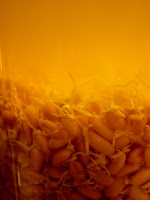 |
| Rejuvelac, a fermented drink that may contain B12, but yet scientifically proven |
my effort actually wasn't totally futile.
There were indeed some alternative sources of B12
which may be suitable for vegs;
just that they are not scientifically established.
Much technical effort and research are required
to establish them as true B12 food source.
Some possible alternatives but yet proven to be reliable sources are:
(A) Nutritional Yeast
- this is a kind of edible yeast which is basically same as
brewer yeast, except that these yeast are cultured in media
with blackstrap molasses.
- nutritional yeast has the capacity to produce B12,
if the medium contains Cobalt (a kind of mineral).
Hence, the culture medium must at least contain molasses
to provide the Cobalt as raw ingredient for B12 synthesis.
- even cobalt is present, it's not guaranteed that B12 will be produced by the yeast.
So, manufacturers prefer to add in VitB into the yeast culture, to fortify it,
for the sake of consistency.
[question: is this still considered natural B12 source??]
- many nutritional yeast out there are not truly nutritional yeast,
because the manufacturers and retailers themselves don't even know
the true definition of nutritional yeasts. If one relies on non-certified nutritional yeast for B12,
it will be very risky, because the chance is that one may mistake non-B12 brewer yeast
as their source of B12, and become B12-deficient unknowingly!
- Unless research effort is put in to ensure consistent production of B12,
nutritional yeast is not going to solve the B12 issue for the veg.
- All in all, naturally grown yeast is not a reliable B12 source.
However if one decides to rely on B12-fortified nutritional yeast
as main source of B12 intake, it's important to get access to trusted brands (e.g. Red Star).
(B) Another possible candidate source for veg-based B12
is Spirulina (yet scientifically established).
- Spirulina was in early days classified as a singular-cell algae.
As mentioned in earlier post, algae produces B12 homologues which are non-human active,
but Spirulina is a very special case.
- due to its special phenotypes, scientists have recently re-classified Spirulina
as a kind of bacteria.
- this is definitely a good news, as it reflects a higher likelihood
that Spirulina's B12 is human-active. Some years ago, a research report
revealed that the B12 was indeed human-active, but the publication
was disputed by the scientific community arguing that
the research team did not adopt the gold standard B12 verification assay
to test for human active B12, but instead adopted a less familiar test.
Altho' the alternative test was still a valid one,
other scientists suspected the gold standard test on Spirulina failed,
hence the need to use alternative test.
Also the research team was funded by the manufacturer of Spirulina supplement,
naturally increasing the skepticism towards the results.
- personally, I am still hopeful about Spirulina, but
before we embrace Spirulina as a reliable source of human active B12,
that one gold standard test need to be done.
Further research (independent) will sure reveal the answer,
but so far nobody would like to fund such a research,
likely due to matters of profitability and lacking B12 awareness.
Just to make myself clear, Spirulina is still not a reliable source of B12 as of today's finding.
(C) One more likely source of B12 is Rejuvelac.
- Rejuvelac is a fermented drink made from germinated grains.
- One may find this source more credible, as it involves bacteria.
However, bear in mind, unless there are sufficient cobalt content on the grains, plus
adequate exposure to light, there is no chance of getting B12,
despite that bacteria do have the capacity to manufacture B12.
- People who made Rejuvelac before will know that
the making of Rejuvelac exposes the fermentation process to little light,
and amatuers knows even less about the content of cobalt in the grains.
One can easily guess the reliability.
- There is indeed possibility of B12 synthesis in Rejuvelac,
but again we need scientific data to verify and quantitate the amount of B12 if any.
- Before any solid scientific data is provided, Rejuvelac is a not a good source of B12.
The stories above may make some vegetarians
want to rush into nutritional yeast, spirulina and rejuvelac.
These foods do offer certain nutritional values and
but it's too dicey to think that
we can chance over to get sufficient B12 from the 3 sources above.
The adverse effect of B12-deficiency is simply too big.
This why veg authorities, up till today,
only recommend B12 fortified food and B12 supplement.
Many veg out there, just like myself, have been hoping to find the reliable and natural way out.
But will there ever be one?
--It's not optimistic as you probably already get a good feel after reading these few blogs.
Should we resign to fate or should we continue our quest?
Let's discuss this in the next blog post.
With metta,
Kee Yew
pureland2012-at-gmail.com
The-critical-veg-issue-of-Vitamin-B12
{Learning Holistic Wellness for Wisdom and Compassion}


















